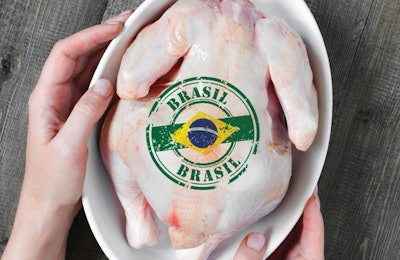
2018 should prove to be a positive year for the Brazilian poultry industry, in contrast to last year, which saw the “worst image crisis in the sector’s history”.
Few in the sector will have been sad to say goodbye to 2017 with its Weak Flesh scandal, and consequent hit to chicken meat sales at home and from customers in international markets.
2018, however, would appear to offer much more promise to Brazil’s poultry sector, with hygiene concerns now over, an upturn in the home economy and a strong economic outlook globally.
On the back of this turnaround, the Brazilian Association of Animal Protein (ABPA) forecasts that chicken meat production this year will be 2-4 percent higher than 2017’s 13.1 million tons, but it also notes that there remain several concerns looming on the horizon.

Home market recovering
Demand from the home market is expected to increase this year as consumers increasingly feel the effects of an improving economy.
Eight quarters of economic contraction came to end in late 2017, as the Brazilian economy returned to expansion, and forecasts indicate that this growth will strengthen as 2018 progresses. Inflation and unemployment are falling, suggesting that local consumers will feel richer.
Where inputs are concerned, the industry benefited from relatively stable feed costs throughout 2017, and this stability is expected to continue during the year ahead.
While the Brazilian economy may be improving, there remains a degree of political uncertainty, with general elections due to be held in the third quarter of the year.
Strengthening international markets
The Brazilian chicken industry sells approximately one-third of its production into export markets, and demand for product from overseas should be stronger this year. ABPA believes Brazilian chicken meat exports will end 2018 1-3 percent higher than 2017’s 4.32 million tons, and potentially reaching a new record high.
It notes that that there will be a continued recovery in demand from the European Union, China and other Asian markets, and that demand from the Middle East will also strengthen this year.
Where China is concerned, the association also hopes that more plants will receive Chinese export certification and will start shipping. There also are hopes of resolving difficulties in the Taiwanese market.
Exports are expected start to El Salvador and the Dominican Republic, and ABPA remains hopeful that it will be able to start selling to Nigeria, rather than relying on the government to open a World Trade Organization (WTO) panel.
Looking toward the end of the year, there may be a small impact on exports resulting from the WTO ruling against Indonesia’s restrictions on imports of products of animal origin, but the full of effects of this are not expected before 2019. Also looking longer term, it is hoped that there may be progress in restarted Mercosur-EU trade talks.
However, all may not be positive for the world’s leading chicken meat exporter as China has made allegations that Brazil is dumping product in its market.

2017 better than feared
Although some minor trade embargoes remain in place, 12 months after the Weak Flesh scandal first broke, the Brazilian poultry industry has restored its reputation at home, and incrementally recovered its position overseas.
Figures released in December 2017 indicate that the industry produced 13.1 million tons of chicken meat, an increase of 1.2 percent, and far better than the industry had expected during the first half of the year.
According to figures released in January, overseas shipments during 2017 were only 1.4 percent lower by volume than in 2016 – when the industry shipped a record amount of meat – closing the year at 4.32 million tons. By value, overseas sales were worth US$7.236 billion, an increase of 5.7 percent.
ABPA Executive President Francisco Turra notes that factors helping the industry to recover its position internationally included Brazil never having experienced an outbreak of avian influenza, that the industry was easily able to prove the quality of its product, and that the association has always maintained good relationships with its contacts overseas.
















